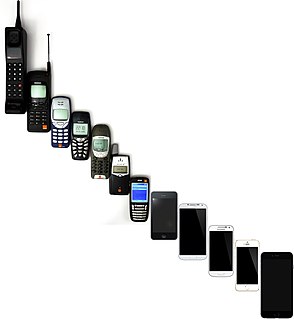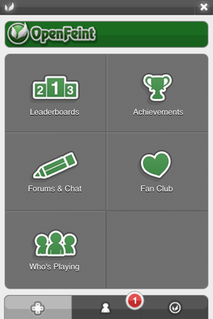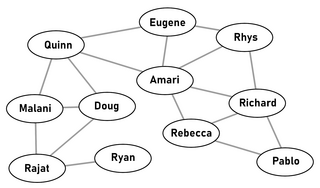
AIM was an instant messaging and presence computer program created by AOL, which used the proprietary OSCAR instant messaging protocol and the TOC protocol to allow registered users to communicate in real time.
Mobile content is any type of web hypertext and information content and electronic media which is viewed or used on mobile phones, like text, sound, ringtones, graphics, flash, discount offers, mobile games, movies, and GPS navigation. As mobile phone use has grown since the mid-1990s, the usage and significance of the mobile devices in everyday technological life has grown accordingly. Owners of mobile phones can now use their devices to make photo snapshots for upload, twits, mobile calendar appointments, and mostly send and receive text messages, listen to music, watch videos, take mobile pictures and make videos, use websites to redeem coupons for purchases, view and edit office documents, get driving instructions on mobile maps and so on. The use of mobile content in various areas has grown accordingly.
Mobile marketing is a multi-channel online marketing technique focused at reaching a specific audience on their smartphones, feature phones, tablets, or any other related devices through websites, E-mail, SMS and MMS, social media, or mobile applications. Mobile marketing can provide customers with time and location sensitive, personalized information that promotes goods, services, appointment reminders and ideas. In a more theoretical manner, academic Andreas Kaplan defines mobile marketing as "any marketing activity conducted through a ubiquitous network to which consumers are constantly connected using a personal mobile device".

Tagged is a social discovery website based in San Francisco, California, founded in 2004. It allows members to browse the profiles of any other members, and share tags and virtual gifts. Tagged claims it has 300 million members as of 2014. As of September 2011, Quantcast estimates Tagged monthly unique users at 5.9 million in the United States, and 18.6 million globally. Michael Arrington wrote in April 2011 that Tagged is most notable for the ability to grow profitably during the era of Facebook.

The Renren Network, formerly known as the Xiaonei Network, is a Chinese social networking service similar to Facebook. It was popular among college students. Renren Inc. has its headquarters in Chaoyang District, Beijing, with additional offices in Shanghai and Guangzhou. Renren had an $740m initial public offering (IPO) on the New York Stock Exchange in April 2011.

Windows Phone (WP) is a discontinued family of mobile operating systems developed by Microsoft for smartphones as the replacement successor to Windows Mobile and Zune. Windows Phone featured a new user interface derived from the Metro design language. Unlike Windows Mobile, it was primarily aimed at the consumer market rather than the enterprise market.

A mobile phone, cellular phone, cell phone, cellphone, handphone, or hand phone, sometimes shortened to simply mobile, cell, or just phone, is a portable telephone that can make and receive calls over a radio frequency link while the user is moving within a telephone service area. The radio frequency link establishes a connection to the switching systems of a mobile phone operator, which provides access to the public switched telephone network (PSTN). Modern mobile telephone services use a cellular network architecture and, therefore, mobile telephones are called cellular telephones or cell phones in North America. In addition to telephony, digital mobile phones (2G) support a variety of other services, such as text messaging, MMS, email, Internet access, short-range wireless communications, business applications, video games and digital photography. Mobile phones offering only those capabilities are known as feature phones; mobile phones which offer greatly advanced computing capabilities are referred to as smartphones.
A mobile social address book is a phonebook on a mobile device that enables subscribers to build and grow their social networks. The mobile social address book transforms the phone book on any standard mobile phone into a social networking platform that makes it easier for subscribers to exchange contact information. The mobile social address book is the convergence of personal information management (PIM) and social networking on a mobile device. While standard mobile phonebooks force users to manually enter contacts, mobile social address books automate this process by enabling subscribers to exchange contact information following a call or SMS. The contact information exchange occurs instantaneously and the user's phonebook updates automatically. Mobile social address books also provide dynamic updates of contacts if their numbers change over time.
The Meet Group, Inc. owns several mobile social networking services including MeetMe, hi5, LOVOO, Growlr, Skout, and Tagged.
Social media marketing is the use of social media platforms and websites to promote a product or service. Although the terms e-marketing and digital marketing are still dominant in academia, social media marketing is becoming more popular for both practitioners and researchers. Most social media platforms have built-in data analytics tools, enabling companies to track the progress, success, and engagement of ad campaigns. Companies address a range of stakeholders through social media marketing, including current and potential customers, current and potential employees, journalists, bloggers, and the general public. On a strategic level, social media marketing includes the management of a marketing campaign, governance, setting the scope and the establishment of a firm's desired social media "culture" and "tone."

RealNetworks, Inc. is a provider of artificial intelligence and computer vision based products. RealNetworks was a pioneer in Internet streaming media delivery software and services. They are based in Seattle, Washington, United States. The company also provides subscription-based online entertainment services and mobile entertainment and messaging services.

OpenFeint was a social platform for mobile games for devices running on Android or iOS. It was developed by Aurora Feint, a company named after a video game by the same developers. The platform consisted of an SDK for use by games, allowing its various social networking features to be integrated into the game's functionality. OpenFeint was discontinued at the end of 2012.
Tanaka Yoshikazu is a Japanese entrepreneur known for founding and developing the social networking service Gree, provided by Gree, Inc.
Game Center is a service by Apple that allows users to play and challenge friends when playing online multiplayer social gaming network games. Games can now share multiplayer functionality between the Mac and iOS versions of the app.

PicDial was a mobile service created by IQzone Inc. and based in Scottsdale, Arizona, United States. PicDial provides users with the ability to automatically see their friends' Facebook and MySpace profile pictures and status messages as Full Screen Caller ID on their mobile phone. The software automatically keeps contacts social networking information current, allowing the most recent profile pictures and status messages to be displayed on incoming and outgoing calls or texts. The PicDial application provides users with a "Favorites Screen," a visual grid that allows users to call or text by selecting a friends social networking profile picture. This Mobile social address book platform allows users to link multiple social networks. The application also enables users to determine which picture will display when a call or text is made to a PicDial friend, giving the user control over the picture seen by friends. This defined picture can either be taken from the users camera on the phone, or pulled from their profile pictures on Facebook or MySpace. When a user changes their picture, this new image will be updated to their friends' phones.

GREE, Inc. is a Japanese Internet media company with headquarters in the Roppongi Hills Mori Tower in Roppongi, Tokyo. It has been operating the social network service GREE since its establishment in December 2004.

Line, styled LINE, is a freeware app for instant communications on electronic devices such as smartphones, tablet computers, and personal computers. Line users exchange texts, images, video and audio, and conduct free VoIP conversations and video conferences. In addition, Line is a platform providing various services including digital wallet as Line Pay, news stream as LINE Today, video on demand as Line TV, and digital comic distribution as Line Manga and Line Webtoon. The service is operated by Line Corporation, a Tokyo-based subsidiary of Softbank Group and the Seoul-based Naver Corporation.

Six degrees of separation is the idea that all people are six or fewer social connections away from each other. As a result, a chain of "friend of a friend" statements can be made to connect any two people in a maximum of six steps. It is also known as the six handshakes rule.
Comparison of user features of messaging platforms refers to a comparison of all the various user features of various electronic instant messaging platforms. This includes a wide variety of resources; it includes standalone apps, platforms within websites, computer software, and various internal functions available on specific devices, such as iMessage for iPhones.










